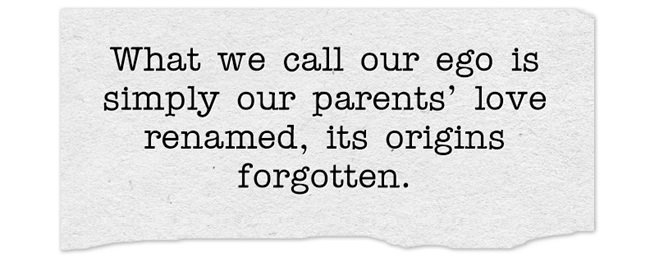Born prejudiced
We are very fortunate to have been born "prejudiced," overflowing in emotions and tendencies—all on account of our genes and environment and their combination. If we were born first and had to choose later, we would never know how to choose. Imagine having the whole gamut of human emotions, values, attitudes, and preferences circling around us like an endlessly renewed and varying sushi train. On what basis would we choose, having been born a tabula rasa? Which logic would guide our decisions? Instead, by coming into the world with feelings, prepared in advance so to speak, we then use our logic to justify our passions, predilections, and sentiments rather than to choose them.

In this and the next article, I will offer some thoughts on how we get our values in the world. Let's start with our mothers and fathers!
The unconditional
The unjustified love of the parents toward their child—unjustified because they love it for no rational reason, unconditionally (as it is put)—is translated into an ego that has no reason to justify it. As it grows, the parents’ unconditional love is transformed into an unconditional love of oneself: what we call the ego. Their unconditional approval is translated into an unquestioned certainty regarding one’s superiority over others. Just like the existence of God is rarely questioned if it is taught as a fact from a very young age, so the unconditional love that the child experiences during his earliest years becomes the unquestioned and unreasonable demand for the unconditional love of everyone he encounters later in life. In this way the unconditional breeds unrealistic expectations.

Made with Quozio.
Source: The Meaning of Life
No one compares to the first
Our mother is the first person we ever seduce. This positively intoxicating feeling of having complete power over someone leaves such a positive and indelible impression that it will last us a lifetime. Our first and ultimate seduction, however, will never be either matched or surpassed: in vain will we seek for unconditional love and acceptance in another person. (Sorry folks!)

Stress-avoidance is reason enough
Initially, when the parent, say, puts forth a value through words or action, there is no reason to reject the value, for there is no conflict (unless the value conflicts with a value given to us by nature). So the child automatically accepts whatever is proposed. Why? Because there is already an incentive to avoid any displeasure. Conflict is perceived as displeasure. If the parent proposes something, and the child rejects it, this will lead to stress. So if the child has no reason to reject the value that is proposed and, furthermore, has a positive reason to avoid stress, then the child will automatically internalize whatever is offered it. This is, then, one of the ways in which values are generated in the young individual. One may even go so far as to say that the child actively hunts for values to internalize; that it rummages through its environment searching for available values, as if desperately looking for an identity; or perhaps it simply wants to benefit from the proven wisdom of the elders by incorporating their values; or perhaps it wants to fit in. Whatever the reason, it does seem as though young humans do more than passively internalize the values around them. A possible analogy is that of language-learning, where the child is not only passively learning whatever language happens to be spoken in its environment, but is more actively involved in the process.
The role of reward
Whenever someone is rewarded unfairly it irritates us, because this is not just a plain fact, it has normative implications. It means that we should endorse that person’s actions, his values, imitate them, imitate him, admire him. To reward an action is to sanction it. It is, furthermore, to pass a judgment. The winner has been declared: we have been the loser. The verdict has been pronounced: we have been the fool. We have spent our life in vain; our actions have been deemed a failure; our strivings declared meaningless and inconsequential; our pursuits, futile. To reward an action is to accord it with special status. We feel this conflict inside, this conflicting drive—one toward what we know is right and the other toward the action that would bring us the desired reward—and this conflict produces the negative feelings. In rewarding someone, others are encouraged to behave like him. If we were a child, without formed values, then we would immediately follow that person’s example without scruples (for the scruples—the opposite values, that is—would be lacking).
So in the case of children, who lack any values, a reward is law. It is dogma. Faced with a value that has a reward attached to it, and one that doesn't, no child would choose the latter. In adults, however, who have already formed their values, rewarding the opposite values to the ones they have embraced cannot only cause irritation but can—if we are talking about core values—lead to feelings of meaninglessness.
Curtain
This completes the (rather brief and light on argument) 10th installment of the Meaning Of Life series. In case you missed the other episodes:
Part 9: Can People Share Ownership of the Same Body?
Part 8: Against Subjectivism - Is Everything Relative?
Part 7: The Value-Laden View of Life
Part 6: I Am Therefore I Harm
Part 5: Nietzsche vs Christianity: Are Christians Nihilists?
Part 4: Can we desire death?
Part 3: Are nihilists being honest when they say life has no value?
Part 2: Does death make life meaningless?
Part 1: Is it possible to be a nihilist?
See you in the next episode!

Come join us on Discord! https://discord.gg/7qyarFD
